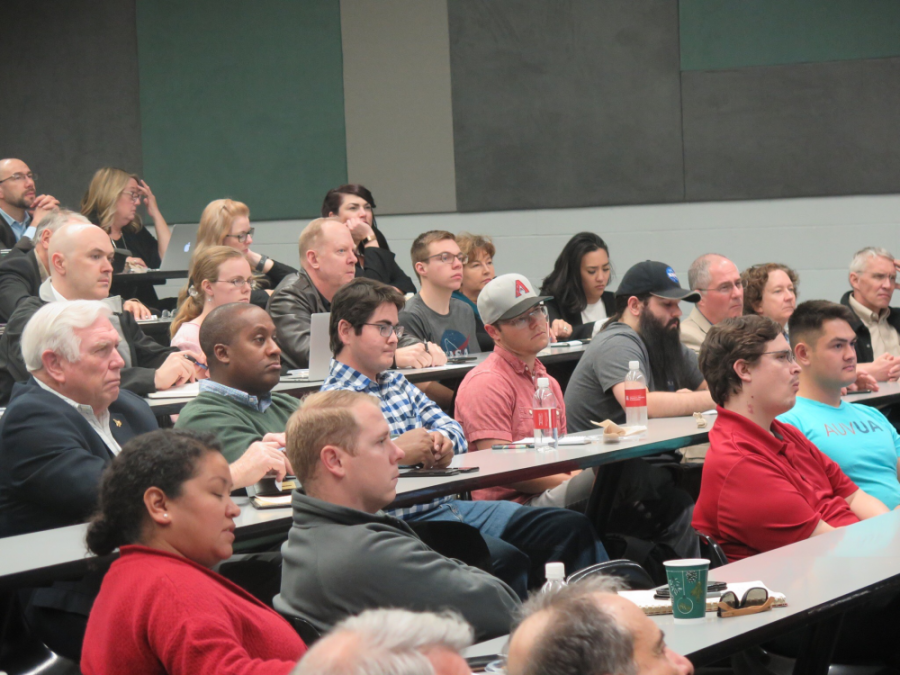Stephen Fleming hosts monthly round tables centered around space, as part of a series he started in 2017. Fleming is the vice president of Strategic Business Initiatives at the University of Arizona and has played a crucial role in bringing the space community together in the Tucson area.
The Space Roundtable features speakers who are knowledgeable in the field of space research. The crowds have grown since the round table started; the attendees of the monthly round tables have grown from 15 at the first to 66 at the most recent. Readers can sign up and learn more here. The Daily Wildcat spoke with Fleming about the round table via email. The interview has been lightly edited for clarity.
Daily Wildcat: What exactly is the Space Roundtable? How did it start and how long has it been going on?
Stephen Fleming: The Arizona Space Business Roundtable is a leadership forum promoting the state’s commercial space ecosystem. Our primary activity is monthly meetings featuring industry, government or military speakers with ample time for both informal networking and facilitated discussion. Speaking topics range from corporate overviews to space policy matters to business plans. Most meetings are held in Tucson, but we also host meetings in the Phoenix area and elsewhere in the state.
I started the Roundtable in September of 2017. I moved to Tucson to join the university in February of 2017, but I have a couple of decades of experience in the spaceflight community. As I reached out to likely partners around Arizona who were engaged in the business of space, I found that I was meeting people who had lived here for decades but who didn’t already know each other!
DW: How do you decide who will be speaking at the round table?
SF: It’s more an art than a science. I have a long list of interested parties, and I juggle the monthly slots based on availability and trying to keep a mix of interesting topics. I’m always interested in new potential speakers!
DW: Where did your interest in space first begin, and how have you pursued it?
SF: I was born in 1962, so I remember watching the Apollo missions on my parents’ black-and-white television. I always planned to be an astronaut … not one of the “right stuff” test pilots, but probably a middle-management type running some important engineering function for a lunar colony. America’s space efforts didn’t evolve that way, and after the Challenger disaster of 1986, I began re-evaluating my belief that NASA was the only way to get Americans into space. I started attending Atlanta meetings of the L5 Society, which was started in Tucson, which promoted human settlements in space, and then national conferences about private enterprise in space. As a venture capitalist, I made my first investment into a space launch startup in 1999 … unfortunately, it was not SpaceX. I have since helped form a national space-investment network and have invested in eleven space-related startups.
DW: The speaker in January was Jim Cantrell, a co-founder of SpaceX and current CEO of Vector. Where did your relationship with him begin, and how did you convince him to speak at the round table?
SF: Jim and I have moved in the same circles for years, but I’m not sure if we ever actually met before I moved to Tucson; I sat on a panel with his former boss, Elon Musk, in 2002. I have known his technical co-founder John Garvey for at least that long. Jim is a hard guy to schedule, because of his incessant travel, but he was eager to speak when the calendars lined up properly. He’s a powerful and authoritative speaker on the shift from a public-sector space program to a private-sector space industry (where government is one of many paying customers). And he’s passionately committed to the Tucson community. He wanted to be sure that his talk was attended not just by business leaders but by undergraduate and graduate students considering working in the space industry – making sure they know they can build great careers in Arizona without moving to California or Texas!
DW: What can you tell me about the speaker scheduled for February?
SF: On February 11th, the round table is partnering with the UA College of Law to bring in Frans von der Dunk, professor of Space Law at the University of Nebraska. Some people are surprised to learn that the field of “space law” has been thriving for fifty years, with a growing body of treaties, legislation and scholarship regarding risks, obligations and capabilities across human spaceflight, satellite communications, radio astronomy, earth observation and now the promise of mining the Moon and asteroids. Von der Dunk is one of the acknowledged world leaders in space law, and it’s a great privilege for the UA community to be able to engage with him directly. Come to his lecture!
DW: What do you have in mind for the future of the Space Roundtable events?
SF: The demand is growing, and we have to figure out how to be more inclusive of the huge amount of space system development in metro Phoenix, as well as activities in Flagstaff, Prescott and Yuma. We are also coordinating with a number of other aerospace organizations in the state who have traditionally focused on the “aero” side of “aerospace” (aircraft, missiles, avionics, etc.) and are exploring how to expand into the “space” side of the equation. The business of space is thriving in Arizona, and just keeping up is a challenge!
DW: Who is the intended audience and, how can people find out more about this series of events?
SF: We have public, private and academic participants, including graduate and undergraduate students. Attendance is free. I maintain a very low-volume mailing list (only a couple of emails a month) which anyone is welcome to sign up for here.
Follow Vinamra Kumar on Twitter















